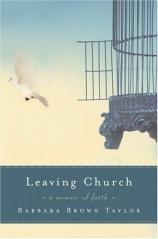Leaving Church: A Memoir of Faith
Review
Leaving Church: A Memoir of Faith
Ten years ago Baylor University published a list of the world's "most effective" English-speaking preachers. Only one of 12 was a woman: Barbara Brown Taylor, a middle-aged Episcopal priest serving a small-town parish in northwest Georgia. A year later, about the time she started publishing volumes of sermons, she surprised her growing number of admirers, resigned from her church, and accepted a teaching "chair of religion" at a local liberal arts college.
Clearly, Taylor isn't the first to leave parish work in search of a second career as a professor. Religion departments are full of clerics. But very few so honestly and so masterfully write the memoir, walking the reader through the conscious and subconscious hopes and fears of all the years of "church life." Not that Taylor betrays parishioner confidences and lays out juicy, rectory gossip. Her writing, rather, covers interior ground.
God's calling aside, what personal qualities drew her to parish work? We readers quickly warm to a gangly girl with a big heart, nursing orphaned birds and mice. We see a young woman from an unchurched home who finds God, largely through an evangelical campus ministry, and wants to serve God and humanity. But after 15 years of urban and then more rural parish work, her compassion fatigue drives her to face that she's spiritually famished. She sees that, for her, being a priest meant "to serve a God who never stops calling people to do more justice and love more mercy, and simultaneously to serve people who nine times out of ten are just looking for a safe place to rest." Even laypeople can understand the dilemma. She includes a delightful quote from professional essayist E. B. White: "When I wake up in the morning," he said, "I can't decide whether to enjoy the world or improve the world; that makes it difficult to plan the day."
Taylor's book would have been stronger if she had put titles on her 17 chapters. The book is organized into three "parts": "Finding" --- her vocation, her parish, her priestly ministry (covering more than half the book); "Losing" --- "What do you do the day after you change your life?"; and a short "Keeping" --- "I empty the bag of my old convictions on the kitchen table to decide what I will keep." Ultimately what she keeps will not satisfy orthodox Christians, as it has more to do with faith (as a verb) than with beliefs.
Taylor presents her career crisis in invigoratingly positive terms, being called to a new phase of life in which she could better commune with God --- through nature, through Sabbath rest, through worship, but from the pew rather than the pulpit, which separated her from the rest of humanity, as did her "collar." She humorously describes going to one --- and only one --- New Year's Eve party: "Seeing their priest in a blue sequined dress…was like running into their dentist in a Speedo at the beach. They could hardly look at me. I asked [husband] Ed if we could go home early, and the following year I helped design a New Year's Eve liturgy." For good or bad, she, the shepherd, was set apart from her flock. "Being in charge was the only way I could learn how much I wanted to be in community."
Ultimately this is a many-layered book, in which Taylor critiques the power structures of the organized church even as she admits that she rather thrived on the power of her position. As she looks back over the past decade, Taylor knows what she's "lost" or walked away from. And she seems very content with where she's landed.
-
Reviewed by Evelyn Bence on November 13, 2011
Leaving Church: A Memoir of Faith
- Publication Date: June 1, 2006
- Genres: Christian
- Hardcover: 256 pages
- Publisher: HarperOne
- ISBN-10: 0060771747
- ISBN-13: 9780060771744





